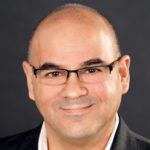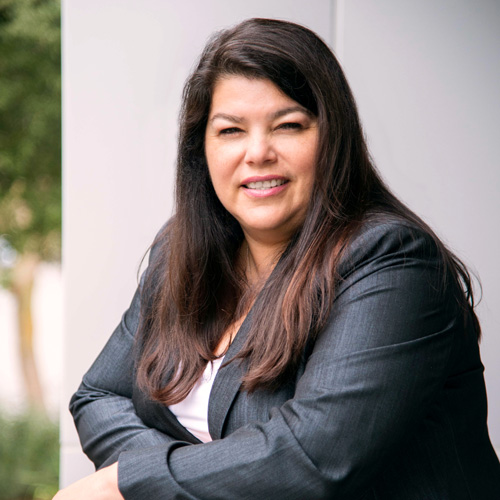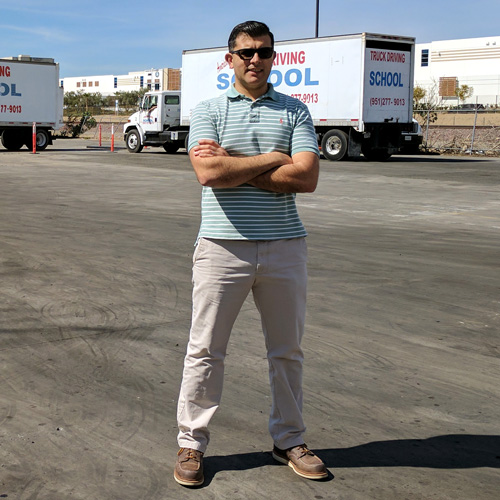Fernando Hernandez is revolutionizing how supplier diversity is evaluated. After growing Microsoft’s supplier diversity program to $2.7 billion from $500 million, Hernandez is now championing governance, social, and environmental performance of suppliers within procurement.
Hernandez, Microsoft’s supplier diversity and sustainability director, sponsored the Committee on Supplier Ratings (COSR) to explore the vision of empowering purchasers globally to engage their suppliers on sustainability issues by leveraging existing environmental, social, and governance (ESG) research ecosystems.
Prior to Microsoft and sponsoring COSR, Hernandez executed comprehensive multicultural marketing strategies for Washington Mutual Bank, and created a new $4 billion market segment when he established multicultural business-to-business and consumer marketing for AT&T.
He describes his background as eclectic, with a bachelor’s degree in accounting from Saint Peter’s College and a master’s degree in information systems from Stevens Institute of Technology. He also studied economics at the Wharton School of Business. Hernandez credits these experiences for allowing him to think more broadly about business and technology.
 “We strive in this space to collaborate and create impact. We do that much better if we can do it together.”
“We strive in this space to collaborate and create impact. We do that much better if we can do it together.”
—Fernando Hernandez
COSR was convened by the Electronic Industry Citizenship Coalition, the Global Initiative on Sustainability Ratings, and Sustainable Purchasing Leadership Council, as well as other organizations such as purchasers with collective annual budgets greater than $1 trillion.
The goal of COSR is to enable Microsoft and other global purchasers to drive positive sustainable impact. Small procurement departments who are struggling to incorporate sustainability into their purchasing decisions will be empowered to achieve more by providing access to expert ESG data. All purchasers, both public and private, will be able to evaluate the sustainability of their supplier portfolios at scale and drive greater impact with the power of their purchases.
“Whatever we can create that can be used by others to have an impact is frosting on the cake,” Hernandez says. “We strive in this space to collaborate and create impact. We do that much better if we can do it together.”
The COSR committee developed, piloted, and refined a three-part framework to evaluate these systems. The first part asks who is involved in providing the rating, and how they conduct that work. The second part asks what sustainability issues the ratings product addresses with its ratings criteria. And the final part asks where the ratings product is applied.
“There’s a lot of commonality between purchasers on what the sustainability expectations are on their suppliers,” Hernandez says. “But we are evaluating the suppliers differently on these common expectations. What we want to do with COSR is to align on those expectations so suppliers can stop wasting time with survey fatigue and get on to winning business.”
Microsoft works with tens of thousands of suppliers, according to Hernandez. “If we can find credible, independent assessments of their performance that would be applicable to other purchasers, then we will have the tools and scale to reach all of those suppliers,” he says. “We address sustainability both systematically and at scale.”
Hernandez points to the attention that publications like Greenbiz, Bloomberg, and Forbes given to the success of the initiative. Since then, Microsoft has established COSR ratings as one of the requirements of its premier supplier program.
This year, more suppliers are sharing their COSR sustainability performance. “The response of the suppliers has been overwhelmingly positive,” Hernandez says. “Almost all of them already have been rated by one of the approved assessors, and the ones who haven’t been like the approach that could be shared with multiple stakeholders.”
One of the unexpected stakeholders is the investment community. The majority of the COSR-approved assessment organizations have applied for sustainable investing. With purchasers aligning on these assessments, both the purchasers’ and investors’ dollars will be pushing the same direction. “It is a truly exciting convergence of resources to move the world in the right direction,” he says.
“Now that we have finished the first phase of COSR, we are pivoting to the next phase where we will work to identify independent capacity builders,” Hernandez continues. “One thing we learned in the first phase is the assessors need to be a neutral judge of the supplier’s sustainability performance. With this established, our next phase is to find who can help our suppliers improve deficiencies.”
In Phase Two, the COSR project team expects to further develop the COSR framework, provide navigation through the landscape of ESG ratings as well as other indices, platforms, data providers, and scorecards.
“There’s so much work that needs to be done and so much change that needs to happen globally,” Hernandez says. “But my passion is driving this, and I want to keep running and running. Passion within business is very powerful and very contagious. It’s unstoppable.”
How to Use Impact Sourcing for Procurement Wins
Thanks to Fernando Hernandez’s diversity efforts in the supply chain, Microsoft is a member of the Billion Dollar Roundtable, an organization that recognizes corporations that spend at least $1 billion with minority- and women-owned businesses each year in the United States. His latest mission is to advance sustainability globally and his team is paving the way for suppliers to have a more positive social and environmental impact. Here, Hernandez shares what it takes to build a successful initiative.
Create Value
“Focus first on finding good, strong companies that are going to help your technology move forward. It’s not just sourcing suppliers, but analyzing strategically what it is that the firm is looking for at this given time and aligning to that. You build your credibility on every team. So it is critical for the first deals to be good, solid deals.”
Channel Passion
“I’ve been trained that all of our initiatives have to live globally and deploy locally. So how do I push this out so it’s universal, but it has the right local flavor and feeling and lands with the right intention? Create these initiatives from a place of love. You have to believe in it, because people are smart. They will know if you’re truly passionate or if it’s marketing spin. The best of the best initiatives are sparked from passion. Create room for that in the business.”
Provide Mentorship
“Remember this is a business. I’m looking for great technology. But I will do my best to support, mentor, develop, scale, and grow them in a loving way—and that’s what makes the difference. I care. If you really care about them, then organically your best will come out. You have to empathize with the people that you’re trying to impact.”

